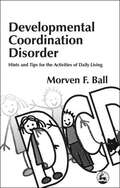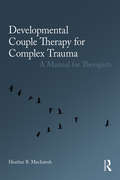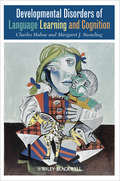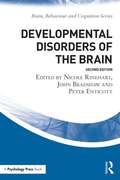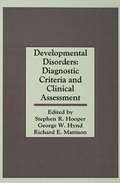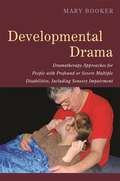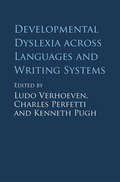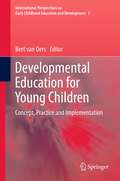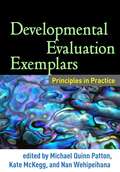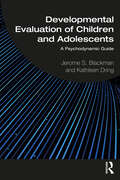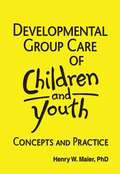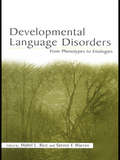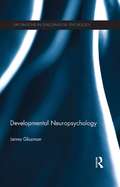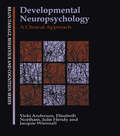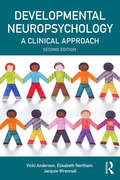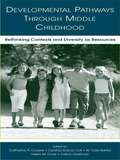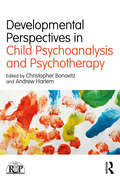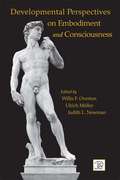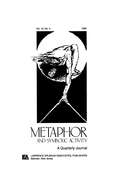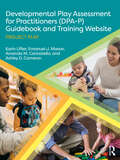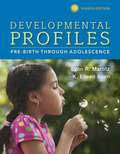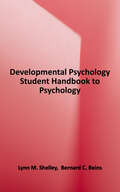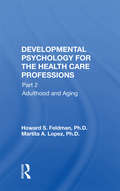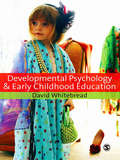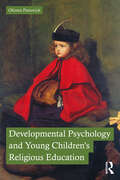- Table View
- List View
Developmental Coordination Disorder: Hints and Tips for the Activities of Daily Living
by Morven BallDevelopmental Coordination Disorder (DCD) is a term used to describe children who have difficulty with movement and specific aspects of learning, and includes dyspraxia, Asperger Syndrome and associated conditions. This easy-to-read booklet answers commonly asked questions about DCD and presents all the necessary information to aid parents, carers and professionals in selecting the best options for their child; sometimes correcting the little things can lead to big results. In clearly laid out chapters, the author describes the features of Developmental Coordination Disorder and provides practical solutions ranging from maintaining posture and personal care through to the more complex tasks of learning. Practical exercises to help improve the DCD child's motor and sensory skills are included, plus an extensive list of useful addresses and resources.
Developmental Couple Therapy for Complex Trauma: A Manual for Therapists
by Heather B. MacIntoshDevelopmental Couple Therapy for Complex Trauma provides therapists with comprehensive and practical guidance for integrating DCTCT into their work with traumatized couples. The book includes an evidence-based framework which emphasizes the importance of containing conflict and helps clients to build emotional regulation and mentalizing skills. The framework is an invaluable asset to all clinicians working with couples dealing with the ravaging impacts of complex trauma, who may not be able to benefit from traditional forms of couple therapy due to challenges in regulating emotions, mentalizing and other aspects of the complex trauma response that limit capacity to engage in relationships and couple therapy. The chapters guide you through the four key stages of DCTCT: Psychoeducation, Building Capacity, Dyadic Processing, and Consolidation. Each stage has accompanying activities and narratives in which to engage traumatized couples and includes a variety of case transcripts to illustrate the approach. Throughout the manual the author provides the reader with: insights from real-world scenarios based on her extensive clinical experience; worksheets that can be used as part of the therapeutic process; systematic analyses of the therapeutic process from the therapist’s point of view; comprehensive recommendations for further reading so that you can develop your expertise in any area of DCTCT. Never losing sight of the fact that the therapist plays an essential role as a coach and mentor for those undertaking couple therapy, this manual is a valuable tool for any clinician working to engage traumatized couples and equip them with the skills they need to develop and maintain a strong and vibrant couple relationship.
Developmental Disorders of Language Learning and Cognition
by Charles Hulme Margaret J. SnowlingThis important new text is a comprehensive survey of current thinking and research on a wide range of developmental disorders.Highlights key research on normal and typical developmentIncludes clinical case studies and diagrams to illustrate key conceptsA reader-friendly writing style
Developmental Disorders of the Brain: Neuropsychological, Neuropsychiatric And Evolutionary Perspectives (Brain, Behaviour and Cognition)
by Nicole J. Rinehart John L. Bradshaw Peter G. EnticottDevelopmental Disorders of the Brain: Brain and Behaviour addresses disabilities that occur or have their roots in the early, developmental phase of life which are of utmost concern to parents, siblings, carers and teachers. This text describes the latest clinical and behavioral findings of disorders which largely or entirely involve the frontostriatal (basal ganglia) system including Tourette's, Obsessive-Compulsive and Attention-Deficit-Hyperactivity disorders, Schizophrenia, Autism, gambling and addiction, depression, and Conduct, Developmental Motor Co-ordination, and language disorders. Examples of disorders involving the frontocerebellar are also described such as Asperger's disorder, Williams, Fragile X, and Cerebellar Cognitive Affective syndromes, and Friedreich Ataxia. This book also discusses the relevant anatomy, physiology and pathology, and some of the major functions mediated by affected or relevant structures, together with accounts of the latest recording, brain imaging and stimulating techniques related to these kinds of disorders. Covering both frontostriatal and frontocerebellar, systems which control and direct normal behavior, and which can fail with often distressing consequences during development, as well as addressing behavioural, clinical, pathophysiological and technical aspects, this text is vital to understanding, diagnosis and management of developmental disorders of the brain. This text will be of great interest to clinicians, researchers, teachers and parents.
Developmental Disorders: Diagnostic Criteria and Clinical Assessment
by Stephen R. Hooper George W. Hynd Richard E. MattisonThese two companion volumes provide a comprehensive review and critical evaluation of the major DSM-III and DSM-III-R child disorders. Their major goal is to provide diagnostic and assessment guidelines that are based on scientific literature in specific clinical domains. Each chapter contains a discussion of the historical background of a particular diagnosis, definitional issues, a critical but selective review of the literature addressing the diagnosis in question, proposed changes in the diagnostic criteria based on the available literature, and proposed assessment models and methods based on the designated criteria. Given the scientific bases for many of these discussions of diagnostic criteria, these two volumes will serve professionals and graduate students in a wide variety of fields: clinical child psychology, child psychiatry, pediatrics, pediatric and school psychology, special education, social work, and other child mental health specialties.
Developmental Drama
by Mary BookerPeople living with severe or profound multiple disabilities (PMLD) can often struggle to connect with the world around them. This book shows how, through enjoying dramatic interaction, they can develop their communication skills, learn to deal with emotions more effectively and gain a greater understanding of their physical and social environment. This guide presents a variety of ways in which drama can be used as a medium for assisting the social and emotional development of people with PMLD, including sensory impairment. It fully explains techniques that are proven to build confidence and promote participation, and illustrates how to include support staff effectively within the process. Charting the author's own journey as a dramatherapist, it clarifies in detail some effective approaches and how to address key issues that arise in dramatherapy practice. This is an accessible and life-saving guide for practitioners looking to use drama in work with people with PMLD, but are unsure where to begin.
Developmental Dyslexia across Languages and Writing Systems
by Ludo Verhoeven Charles Perfetti Kenneth PughThis volume presents the first truly systematic, multi-disciplinary, and cross-linguistic study of the language and writing system factors affecting the emergence of dyslexia. Bringing together a team of scholars from a wide variety of disciplines, it takes a dual focus on the language-specific properties of dyslexia and on its core components across languages and orthographies, to challenge theories on the nature, identification and prevalence of dyslexia, and to reveal new insights. Part I highlights the nature, identification and prevalence of dyslexia across multiple languages including English, French, Dutch, Czech and Slovakian, Finnish, Arabic, Hebrew, Japanese and Chinese, while Part II takes a cross-linguistic stance on topics such as the nature of dyslexia, the universals that determine relevant precursor measures, competing hypotheses of brain-based deficits, modelling outcomes, etiologies, and intergenerational gene-environment interactions.
Developmental Education for Young Children: Concept, Practice and Implementation
by Bert Van OersDevelopmental Education is an approach to education in school that aims at promoting children's cultural development and their abilities to participate autonomously and well-informed in the cultural practices of their community. From the point of view of Cultural-historical Activity theory (CHAT), a play-based curriculum has been developed over the past decades for primary school, which presents activity contexts for pupils in the classroom that create learning and teaching opportunities for helping pupils with appropriating cultural knowledge, skills, and moral understandings in meaningful ways. The approach is implemented in numerous Dutch primary schools classrooms with the explicit intention to support the learning of both pupils and teachers. The book focuses especially on education of young children (4 - 8 years old) in primary school and presents the underpinning concepts of this approach, and chapters on examples of good practices in a variety of subject matter areas, such as literacy (vocabulary acquisition, reading, writing), mathematics, and arts. Successful implementation of Developmental Education in the classroom strongly depends on dynamic assessment and continuous observations of young pupils' development. Strategies for implementation of both the teaching practices and assessment strategies are discussed in detail in the book.
Developmental Evaluation Exemplars
by Michael Quinn Patton Nan Wehipeihana Kate MckeggResponding to evaluator and instructor demand, this book presents a diverse set of high-quality developmental evaluation (DE) case studies. Twelve insightful exemplars illustrate how DE is used to evaluate innovative initiatives in complex, dynamic environments, including a range of fields and international settings. Written by leading practitioners, chapters offer a rare window into what it takes to do DE, what roles must be fulfilled, and what results can be expected. Each case opens with an incisive introduction by the editors. The book also addresses frequently asked questions about DE, synthesizes key themes and lessons learned from the exemplars, and identifies eight essential principles of DE. See also Michael Quinn Patton's Developmental Evaluation, the authoritative presentation of DE.
Developmental Evaluation of Children and Adolescents: A Psychodynamic Guide
by Kathleen Dring Jerome S. BlackmanDevelopmental Evaluation of Children and Adolescents: A Psychodynamic Guide offers an in-depth, multiperspective analysis of any delays, regressions, or aberrations in a child’s developmental trajectory. Blackman and Dring help the evaluator understand the child’s internal conflicts, as well as the family/environmental context in which the child functions. Chapters move longitudinally through the developmental stages. In each chapter, there are several "key questions" for evaluators to ask parents, fulfilling the need for clinicians to quickly assess children, followed by a longer question sheet and explanation of various answers to the questions for a more thorough assessment. Each chapter also provides a discussion of the child’s phase and a table listing the questions and answers for quick reference. Finally, brief case studies demonstrate how the developmental history and the initial session with the child should be integrated. This book serves as an essential clinical guide to the developmental evaluation of children and will be suitable for all therapists working with children.
Developmental Group Care of Children and Youth: Concepts and Practice
by Jerome Beker Henry W MaierA recognized leader in the professional development of the child and youth care field presents--in this single volume--a collection of his work related to group care work with children and youth. Henry Maier shares his observations about human development in the group care context, the perceptions of children and youth, the environments in which we work with them, the role of the worker, and the preparation of child and youth care workers. Dr. Maier’s practical approaches reflect the most recent research and thinking in human development. This book is a practical text for courses in the child and youth field, as well as a useful handbook for child and youth caseworkers already on the job. BACKCOVER COPY In what way can group care--non-familial living--assure children a developmental progress similar to that of children growing up within regular family care settings? In his practical new text, Henry Maier--one of the most vibrant, creative, and humane figures in child and youth care work today--answers that question for child care professionals using a developmental perspective in his approach to residential group care. He focuses on the developmental requirements of children and adolescents in relation to the care they receive while they are in no-familial, group living situations and also highlights training for the caregivers in order that they can effectively provide the kind of caring involvement that children and youth require. “The real contribution of this book . . . is that it cuts throught the confusion of competing values and competing points of view to focus on the care at the heart of child care work,” attests Richard W. Small, PhD, Executive Director of the Walker Home and School, Needham, Massachusetts (from the Preface).
Developmental Language Disorders: From Phenotypes to Etiologies
by Mabel L. Rice Steven F. WarrenDevelopmental Language Disorders: From Phenotypes to Etiologies is based on the recent conference of the same name sponsored by the Merrill Advanced Studies Center of the University of Kansas. In the past 10 years, considerable advances have taken place in our understanding of genetic and environmental influences on language disorders in children. Significant research in behavioral phenotypes, associated neurocortical processes, and the genetics of language disorders has laid the foundation for further breakthroughs in understanding the reasons for overlapping etiologies, as well as the unique aspects of some phenotypes. Too often the findings are disseminated in a fragmented way because of the discrete diagnostic categories of affectedness. This volume attempts to assimilate and integrate the findings of the transdisciplinary research toward a more coherent picture of behavioral descriptions, brain imaging studies, genetics, and intervention technologies in language impairment. The contributing authors are all scholars with active programs of research funded by the National Institutes of Health involving diverse clinical groups of children with language impairments.
Developmental Neuropsychology (Explorations in Developmental Psychology)
by Janna GlozmanDevelopmental Neuropsychology draws upon the research of Alexander Luria and Lev Vygotsky to present a comprehensive study of developmental neuropsychology from a Russian, and Western perspective. Janna Glozman offers a fresh and accessible analysis of Luria and Vygotsky’s collaboration, which greatly influenced the field of neuropsychology as we know it today. The text provides an examination of theoretical and methodological foundations of developmental neuropsychology, which Glozman describes and systemizes, before providing methods of assessment and neuropsychological aspects of specific situations. In her work Glozman considers: abnormal social mechanisms methods of assessment and remediation historical developments specific disabilities including dyslexia, ADHD and autism Glozman’s comparative text makes Russian developmental psychology practically accessible to a western audience. It is valuable reading for researchers in developmental and clinical psychology, as well as professionals in special education, speech therapy and social work.
Developmental Neuropsychology: A Clinical Approach
by Vicki Anderson Elisabeth Northam Jacquie WrennallThis book addresses key issues in child neuropsychology but differs from other books in the field in its emphasis on clinical practice rather than research issues. Although research findings are presented, they are described with emphasis on what is relevant for assessment, treatment and management of pediatric conditions. The authors have chosen to focus on a number of areas. First, the text examines the natural history of childhood CNS insult, highlighting studies where children have been followed over time to determine the impact of injury on ongoing development. Second, processes of normal and abnormal cerebral and cognitive development are outlined and the concepts of brain plasticity and the impact of early CNS insult discussed. Finally, using a number of common childhood CNS disorders as examples, the authors develop a model which describes the complex interaction among biological, psychosocial and cognitive factors in the brain injured child.The text will be of use on advanced undergraduate courses in developmental neuropsychology, postgraduate clinical training programmes, and for professionals working with children in clinical psychology, clinical neuropsychology, and in educational and rehabilitation contexts.
Developmental Neuropsychology: A Clinical Approach (Brain, Behaviour and Cognition)
by Vicki Anderson Elisabeth Northam Jacquie WrennallThis fully updated edition of Developmental Neuropsychology: A Clinical Approach addresses key issues in child neuropsychology with a unique emphasis on evidence-informed clinical practice rather than research issues. Although research findings are presented, they are described with emphasis on what is relevant for assessment, treatment and management of paediatric conditions. The authors focus on a number of areas. First, the text examines the natural history of childhood central nervous system (CNS) insult, highlighting studies where children have been followed over time to determine the impact of injury on ongoing development. Second, processes of normal and abnormal cerebral and cognitive development are outlined and the concepts of brain plasticity and the impact of early CNS insult discussed. Third, using a number of common childhood CNS disorders as examples, the authors develop a model which describes the complex interaction among biological, psychosocial and cognitive factors in the brain-injured child. Finally, principles of evidence-based assessment, diagnosis and intervention are discussed. The text will be of use on advanced undergraduate courses in developmental neuropsychology, postgraduate clinical training programmes and for professionals working with children in clinical psychology, clinical neuropsychology and educational and rehabilitation contexts. The text is also an important reference for those working in paediatric research.
Developmental Pathways Through Middle Childhood: Rethinking Contexts and Diversity as Resources
by Helen Davis Catherine R. Cooper Cynthia T. García Coll W. Todd Bartko Celina ChatmanWhen can contexts and diversity be resources, rather than risks, for children's developmental pathways? Scholars, policy makers, and practitioners increasingly realize that middle childhood matters as a time when children's pathways diverge, as they meet new and overlapping contexts they must navigate on their way to adolescence and adulthood. This volume shines new light on this important transition by tracing how these contexts -- cultural, economic, historical, political, and social -- can support or undermine children's pathways, and how children's own actions and the actions of those around them shape these pathways. With a focus on demographic changes taking place in the U.S., the volume also maps how experiences of diversity, reflecting culture, ethnicity, gender, and social class, matter for children's life contexts and options. Chapters by a team of social scientists in the MacArthur Foundation Research Network on Successful Pathways through Middle Childhood present the fruits of ten years of research on these issues with diverse cultural and ethnic communities across the U.S. These include:*a set of models and measures that trace how contexts and diversity evolve and interact over time, with an epilogue that aligns and compares them;*surprising new findings, quantitative and qualitative, with cases showing how children and families shape and are affected by their individual, recreational, institutional, and cultural experiences; and *applications to policy and practice for diverse children and families. The importance of these new models, methods, findings, and applications is the topic of commentaries by distinguished scholars with both U.S. and international perspectives.The book is intended for researchers, practitioners, and policy makers, as well as students in psychology, sociology, and education.
Developmental Perspectives in Child Psychoanalysis and Psychotherapy (Relational Perspectives Book Series)
by Christopher Bonovitz Andrew HarlemDevelopmental Perspectives in Child Psychoanalysis and Psychotherapy incorporates recent innovations in developmental theory and research into our understanding of the nature of change in child psychotherapy. Diverse psychoanalytic ideas and individual styles are represented, challenging the historical allegiance in analytic child therapy to particular, and so often singular, schools of thought. Each of the distinguished contributors offers a conceptually grounded and clinically rich account of child development, addressing topics such as refl ective functioning, the role of play, dreaming, trauma and neglect, the development of recognition and mutuality, autism, adoption, and non- binary conceptions of gender. Extended clinical vignettes offer the reader clear vision into the convergence of theory and practice, demonstrating the potential of psychoanalytic psychotherapy to move child development forward. This book will appeal to all practicing mental health professionals.
Developmental Perspectives on Embodiment and Consciousness (Jean Piaget Symposium Ser.)
by Ulrich Müller Willis F. Overton Judith L. NewmanUntil recently, the body has been largely ignored in theories and empirical research in psychology, particularly in developmental psychology. Recently however, several conceptions of the relation between body and mind have been developed. Common among these conceptions is the idea that the body plays an important role in our emotional, social, and
Developmental Perspectives on Metaphor: A Special Issue of metaphor and Symbolic Activity
by Ellen WinnerResearch on the development of metaphor abilities in children can be dated back as far as 1960, with Asch and Nerlove's pioneering study, which concluded that children were unable to understand metaphors until middle or even late childhood. However, the study of metaphor in children did not take off until the 1970s; research continued to show metaphor as a relatively late-developing skill, based on children's inability to paraphrase correctly metaphoric sentences presented out of any situational or narrative context. In the past decade, research into the development of figurative language has broadened considerably in scope. Efforts have been underway to demonstrate the cognitive underpinnings of the ability to make sense of figurative language and to demonstrate the role of metaphor and its cousin, analogy, in the development of cognition. Metaphor is now considered to be a central aspect of language and thought and thus a crucial variable in cognitive development. The articles in this issue support the claim that no longer can any theory of language acquisition afford to ignore how children are able to recognize the distinction between what is said and what is meant and how they are able to grasp what is meant when people say things they do not mean.
Developmental Play Assessment for Practitioners (DPA-P) Guidebook and Training Website: Project Play
by Karin Lifter Emanuel J. Mason Amanda M. Cannarella Ashley D. CameronDevelopmental Play Assessment for Practitioners (DPA-P) Guidebook and Training Website: Project Play offers a comprehensive assessment of naturally occurring play activities for evaluating young children’s developmental progress accurately, so that useful interventions can take place as early as possible. It can be used by practitioners in a wide range of educational and therapeutic settings and is designed to support developmental progress through planning interventions in play, and using what we know about a child’s progress in play to plan play-based interventions in cognition, language, motor, social-emotional, and self-help skills. The guidebook and training website provide a comprehensive introduction to how to successfully use the assessment with infants, toddlers, and young children with disabilities or at risk for disabilities. The comprehensive guidebook offers an overview of the DPA-P and Project Play, defines play, discusses the background literature on play, and explains why this assessment is needed. Clear guidance helps practitioners and family members understand play, how to evaluate play, and how to use play for different purposes. The guidebook offers: an introduction to the comprehensive training website and how to use it understanding of the categories of play assessed and their definitions guidance on how to administer the assessment and prepare a summary evaluation of a child’s performance clear instructions for the coding sheets and scoring guidelines for constructing sets of toys guidance on taking the results of the DPA-P evaluation of a child’s progress in play to develop a plan of activities for intervention explanation of how you evaluate activities at the absence, basic, emergence, and mastery levels for developing a plan suggestions for assembling sets of toys for intervention, based on toys available in children’s homes and early childhood settings procedures for facilitating or teaching play activities to children who are developing more slowly than their peers technical aspects of the assessment To make the DPA-P as flexible as possible for all practitioners, it also offers guidance on adaptations for administering the test, in the coding sheets, with toys to enhance cultural appropriateness for gathering the observations, and for supporting interventions in play. The Developmental Play Assessment for Practitioners (DPA-P) can be used in natural settings and takes 30 minutes to complete. It is a valuable tool for all those who serve, or are training to serve, young children in early childhood settings, schools, service agencies, colleges, and universities. It will be of great benefit for early intervention personnel, speech-language pathologists, physical therapists, occupational therapists, and psychologists.
Developmental Profiles: Pre-Birth Through Adolescence (Eighth Edition)
by Lynn R. Marotz K Eileen AllenDesigned to help you comprehend the complexity of child development, DEVELOPMENTAL PROFILES: PRE-BIRTH THROUGH ADOLESCENCE, Eighth Edition, highlights major characteristics for each of the developmental domains in a concise, non-technical, point-by-point format. The book covers the full range of stages in child and adolescent development, highlighting important safety considerations at each developmental stage. This edition provides extensive information that teachers, families, and service providers will find useful for promoting individualized learning and identifying developmental delays in their earliest stage. It integrates current research and theory throughout, and emphasizes the importance of working collaboratively with diverse families to achieve maximum benefit for children. Both preservice and practicing teachers will turn to this excellent reference over and over again for comprehensive, easy-to-find information about each stage of development.
Developmental Psychology (Student Handbook to Psychology)
by Lynn M. ShelleyPeople undergo vast changes in a lifespan. Developmental Psychology shows how we change as we gradually move from infancy into childhood and, ultimately, through adulthood and old age. The processes of development are affected both by the environment and by our genetic makeup in complex and interesting ways. The development of our ultimate ways of thinking, socializing, and feeling results from the world we encounter as we move through life.
Developmental Psychology For The Health Care Professions: Part 1: Prenatal Through Adolescent Development
by Howard S. FeldmanIn this book, the first of a two-volume set focusing on normal psychological development throughout the life span, Katherine A. Billingham discusses the basics of normal development and presents specific research findings in developmental psychology, sociology, and health care psychology that are especially relevant to the health care professional.
Developmental Psychology and Early Childhood Education: A Guide for Students and Practitioners
by Dr David WhitebreadThe importance of high quality early childhood education is now universally recognised, and this quality crucially depends upon the practitioners who work with our young children, and their deep understanding of how children develop and learn. This book makes a vital contribution to this understanding, providing authoritative reviews of key areas of research in developmental psychology, and demonstrating how these can inform practice in early years educational settings. The book's major theme is the fundamental importance of young children developing as independent, self-regulating learners. It illustrates how good practice is based on four key principles which support and encourage this central aspect of development: - secure attachment and emotional warmth - feelings of control and agency - cognitive challenge, adults supporting learning and children learning from one another - articulation about learning, and opportunities for self-expression. Each chapter includes: - typical and significant questions which arise in practice related to that area of development - an up-to-date review of key research, including insights from observational and experimental work with young children, from evolutionary psychology, and from neuroscientific studies of the developing brain - practical exercises intended to deepen understanding and to inform practice - questions for discussion - recommended further reading. This book provides an invaluable resource for early years students and practitioners, by summarizing new research findings and demonstrating how they can be translated into excellent early years practice. Watch this video of David Whitebread at his book launch, presenting the key points of the book and his reasons for writing it. David Whitebread is Senior Lecturer in Developmental Psychology and Early Years Education in the Faculty of Education, University of Cambridge.
Developmental Psychology and Young Children’s Religious Education
by Olivera PetrovichDevelopmental Psychology and Young Children’s Religious Education sets out to identify the conceptual pre-requisites for young children’s religious education learning and clearly highlights the challenges that children and their teachers encounter in the RE educational process. Based on a study with 431 children aged 5 to 7 years from different schools, faith and non-faith, and 47 teachers from the same schools as the children, this book offers an insightful look into younger children’s religious education, providing statistical evidence to dismantle the belief that young children lack the ability to conceptualise God in abstract terms. The information obtained from these children and their teachers reveals a major discrepancy between the teachers’ perceptions of young children’s conceptual abilities for RE learning, on the one hand, and children’s actual abilities revealed in their responses throughout the study, on the other. Based on the evidence described in the volume, Petrovich argues that teacher-training courses for primary RE need to be designed to include a substantial component of contemporary developmental research that is of direct relevance to children’s conceptual abilities and understanding of abstract concepts. Developmental Psychology and Young Children’s Religious Education is essential reading for students and researchers in developmental psychology, religious education, teacher education, education studies and cultural anthropology.
